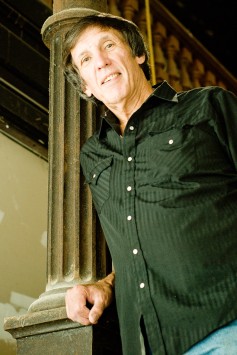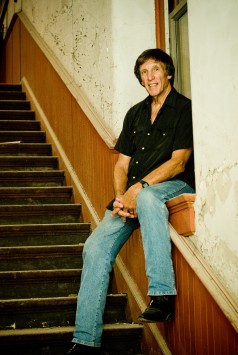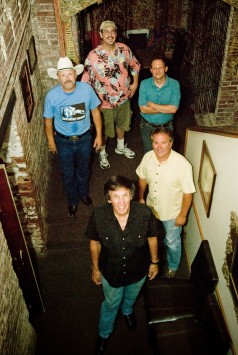social bookmarking tools:
 |
|
| Available RSS Feeds |
|---|
 - Top Picks - Top Picks |
 - Today's Music - Today's Music |
 - Editor's Blog - Editor's Blog
|
 - Articles - Articles
|
Add Louisville Music News' RSS Feed to Your Yahoo!
|

MICKEY CLARK'S SECOND ACT
"There are no second acts in American lives."
--F. Scott Fitzgerald
"Horsepucky!"
--Anybody who has proven Fitzgerald wrong
It's a slim trade paperback with a dark blue cover, its front sheathed with band names in silver typescript. It's out of print now, but you might find it on the bookshelf of anyone who has been connected with the music industry in Louisville within the last sixty years. In it you'll find lots of pictures of bands you've probably never heard of who once played in clubs that are only open in the memories of a certain group of people. You'll see a picture of a young Steve Ferguson, dressed as if he's summering from prep school, his hair Vitalised into a perfect part. You'll see a young Tim Krekel, with curly, neck-length hair and dressed comfortably in leather and denim, leaning against a brick wall with his bandmates. And there is page after page of studio shots and casual photos of Soul Inc., The Carnations, The Sultans, The Epics, Cosmo & the Counts, the various iterations of The Monarchs, and, of course, NRBQ.
It's called Louisville's Own (An Illustrated Encyclopedia of Louisville Area Recorded Pop Music from 1953 to 1983), a jawbreaker of a title, by Brenda and Bill Woods. If you made a record in Louisville somewhere within those 30 years, you got an entry consisting of a short bio, a list of your record(s) and a picture.
One picture is of a guy with thick dark hair, a black cowboy hat, and a smile big and bright enough to light up an Interstate highway work crew late at night. Nearly 30 years on, though, the face is a little craggier, the hair has a some threads of gray through it, but the beaming, big smile is still in place.
It belongs to Mickey Clark, songwriter, singer, veteran of the 1960s college coffeehouse folk era and Nashville's outlaw-country-and-quilted-shirt realm of the 1970s. He's a one-man name drop, connected directly or peripherally with John Prine, Kinky Friedman, Bob Dylan, Guy Clark, Jerry Jeff Walker, Sam Bush, Ian Tyson (of Ian and Sylvia), Kris Kristofferson. His songs have been recorded by The Oak Ridge Boys (one of which, "She's Gone to L.A. Again," was on their multi-platinum album Fancy Free, the same one that spawned "Elvira"), Tompall & the Glaser Brothers, Jerry Lee Lewis, and Glen Yarbrough. He has recorded for the Smithsonian Institution and performed songs featured on two albums released by The National Geographic Society: Civil War Songs and Cowboy Songs. And for a stretch of time during the early 1980s, he recorded tribute songs to the University of Louisville Men's basketball team each year they were in the NCAA tournament. The most famous of these was "The Cardinal Cannonball."
And now at age 70, when most men are already a few years into retirement and golfing every day and living the kind of life depicted in Centrum Silver commercials, Clark is just starting the second act of his music career, which included the release last year of his solo recording, Winding Highways, on ear X-tacy Records. Plus he has a band called Blue Norther that plays two to three nights a week around Louisville.
"I keep reinventing myself," he said. "Survival, they call it."
A 1958 graduate of Flaget High School, where he played basketball, Clark graduated from St. Joseph's University in 1962 with a degree in mathematics (which "Just naturally led into a music career," he said). But at the beginning of his senior year, he bought an acoustic guitar and got into a talent show. From there the career started.
"I went to Purdue after St. Joe's to get a masters in statistics. I met a freshman who played 12-string guitar: Larry Foster from Chicago. I got into a talent show at Purdue, then started getting job offers on campus to play. I ended up dropping out of graduate school, moved to Chicago that summer, and ended up finding myself with a music career."
While in Chicago, Clark and Foster teamed with a young woman named Marita Crites (from Dayton, Ohio) to become The New Village Singers, touring the folk circuit from Chicago to Florida and New York. The band migrated to New York City in 1965 during the height of the American folk music era, when coffeehouses were full and someone with an acoustic guitar was on stage wailing or whispering about Tom Dooley hanging his head, answers blowing in the wind, flowers going away, or greener grass on the far side of the hill. An era that seemed to abruptly collapse when Bob Dylan plugged in an electric guitar at that year's Newport Folk Festival. Clark and his bandmates were renamed The Three of Us and released two singles on Kapp Records, where their labelmates included pianist Roger Williams, Jack Jones, Mel Tillis, Louis Armstrong, and a guy who would eventually make his way to Louisville: Turley Richards.
But the trio didn't stay united for too much longer.
"Larry got drafted," Clark said, "and our manager wanted us to continue, but Marita had fallen in love with Larry and she didn't want to continue. [The two of them eventually got married – TR] Our manager said he had a guy who was a freshman at Harvard he could replace Larry with. The guy was Gram Parsons.
"Of course I'd be dead in the desert if that had materialized," Clark said, referring obliquely to Parsons's LSD-induced behaviors during the final years of his life and his bizarre open-coffin cremation at the hands of two friends in the desert of the Joshua Tree National Monument.
Clark continued his story. "After the group broke up, I went to Indiana University for a year, trying to give up music. That didn't work. So I went back to New York and started working solo. Ended up getting on the national college coffeehouse circuit, playing colleges all over the country. Folk music had moved on to folk rock, then it kind of died. So a lot of people in New York started moving into acid rock. I said that's not me. Then I heard Glen Campbell's cut of ‘Gentle on My Mind' written by John Hartford. I found out that it was published in Nashville by the Glaser Brothers. So I called the Glaser Brothers to set up an appointment and flew down from New York. I met with them. They offered me a writer's contract and helped me escape from New York at the beginning of 1971."
Two years before this, though, Clark married a woman named Sandy Caldwell, whom he had met on a return trip to Louisville in 1966. They have been together for 41 years and have a son, Brennan, who is 25.
From Glaser Brothers, Clark moved to Combine Music, the publishing home of Kris Kristofferson, Tony Joe White, and a young Louisville native named Tim Krekel. Together they collaborated on a song called "Let's Make a Memory to Go," one of the last hits for Mike Lunsford.
In 1973, while writing for Combine, Clark met Mickey White, who eventually became Townes Van Zandt's guitarist.
"When Mickey and I played together at the Earl of Old Town in Chicago," Clark said, "the night before The Band's tour started, Bob Dylan and three other guys from The Band came in. And about 10 days later, Ben Fong-Torries interviewed him and he talked about the record label he was going to start: Ashes and Sand. He mentions Mickey and me as potential artists on his label."
Unfortunately, Dylan's label didn't materialize, but Clark kept writing and singing, performing at the Philadelphia Folk Festival two times in the late 1970s, recording for the Smithsonian, and writing songs. However, halfway into the 1980s, things came to a slow, klunky stop for him.
"I lost my voice," he said. "I didn't ever think I was going to sing again. I did gigs every so often. It was kind of painful. In 1989, our kid was five years old. I was playing in bars for a living. With the impending costs of raising a kid, bar wages didn't exactly look like they'd cover the costs. So my wife kind of nudged me into getting a job that had a regular income. I ended up going into telecommunications. I was in sales for 15 years with LDDS, which evolved into MCI Worldcom.
"After I lost my job at the end of 2003, I found my life again."
Clark's first step to proving F. Scott Fiztgerald wrong (whose "there are no second acts" quote is one of the epigraphs for this story) was to, as he put it, take money out of his retirement fund and invest in himself."
"Before I leave this planet, I'd like to record some of my songs," he said. "some old, some new. But I want to find the perfect producer. I want to find a producer that has roots in country and roots in folk. So a good friend of mine, Barry Drake, suggested Jim Rooney."
Rooney had been heavily involved in the country and folk genres for almost 50 years. He managed Club 47, where Joan Baez had been discovered, coordinated the talent for the 1965 Newport Folk Festival, operated Albert Grossman's Bearsville Sound studio, all before he moved to Nashville, where he learned engineering and producing. Since then he has produced recordings for John Prine, Bonnie Raitt, Townes Van Zandt, and was the producer for Nancy Griffith's Grammy-winning Other Voices, Other Rooms.
Clark continued. "He lives part of the year in Ireland, so I tracked him down in Galway and asked if he would produce me. He told me to send him a CD of vocal and guitar songs. I did. But it turns out that Sam Bush and Jerry Jeff Walker were also good friends of Jim. I told them I was trying to get him to be my producer, so they both put in a good word for me with him."
A few months later, Clark met Rooney in Nashville. Rooney agreed to take on the project. Winding Highways got underway.
Clark got many of the friends he has made over the last half century to help out as vocal or instrumental guests on Winding Highways. In addition to Bush and Walker, Clark is joined by John Prine, Kinky Friedman, Robin and Linda Williams, Clark's longtime friend Turley Richards, and, of course, the late Tim Krekel.
Also essential to finding the right producer and talent is making the deal with a label to fund and distribute the product. For that, Clark turned to John Timmons.
"I talked with him before I got Jim Rooney on board," Clark said. "I showed him an article on Jim and said this is the guy I want to produce me. At this point I had not even talked to Jim. But John really believed in the project from the beginning, and came on board and helped out financially."
Since its release last year, Winding Highways has received acclaim from such publications as Crawdaddy and the no-longer-published No Depression, plus it won Album of the Year from the Academy of Western Artists.
In addition to Winding Highways, Clark is beefing up the second act of his life with live gigs with his band Blue Norther.
"It's the same name of a band I had back in the 70s," he explained. "A blue norther is a storm in Texas when there's a nice, calm, beautiful day, then all of a sudden the temperature drops about 30 degrees and clouds roll through. The name was inspired by two people and two of their songs. Ian Tyson's song ‘Someday Soon' that Judy Collins recorded, with the line ‘Blow, you old blue norther.' She actually says northern. And Billy Joe Shaver's ‘Willy, you're as wild as a Texas blue norther,' from his song ‘Willy the Wandering Gypsy and Me.'"
Consisting of Clark, Dale Perry on guitar, Marty Miller on bass, Chip Bush (Sam Bush's cousin) on mandolin, and Tom Cunningham on fiddle, Mickey Clark and Blue Norther manage to play several nights a week at venues around town.
If the half-century-long career of Mickey Clark proves F. Scott Fitzgerald wrong in one way, it proves him right in another. "Vitality shows in not only the ability to persist but the ability to start over," he wrote in a collection of epigrams published in a collection called The Crack Up. Clark ran long in folk and country for nearly three decades: writing and selling songs, touring, playing bar gigs, all while connecting with the genre's major performers. The relatively short detour into telecommunications sales only became a means to starting over. A long-overdue reboot, if you will, with some tweaking of the hardware.
Put another way, if it's true that (as the bumper stickers and ‘fridge magnets state) it's never too late to have a happy childhood, then, as Mickey Clark proves, it's never too late to be a recognized country and folk-music superstar.
Find out just how much a superstar Mickey Clark is by visiting www.mickeyclark.com.






